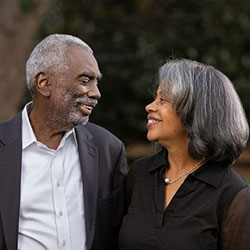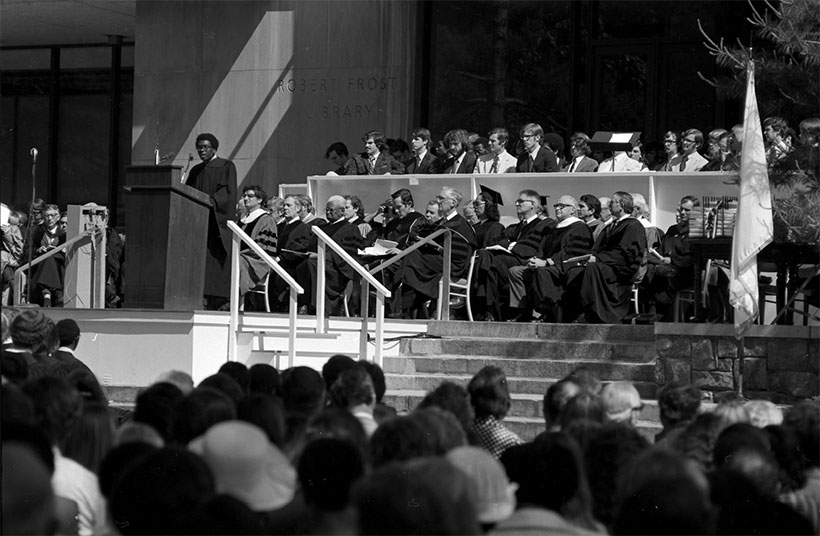We who came through American colleges and universities during the late sixties and early seventies have survived a difficult period. We have come through a troubled time. The history of our undergraduate years has been one of trouble, of unrest, of desperation, of uncertainty. It has been one of protest, of war, of rebellion. It has been a history of militance, of resistance, of individual assertiveness. Those years—one might well call them an era—had a character all their own. And we, as products of those years, of that era, have been shaped by that character. Furthermore, as products of those years, we have been much maligned, much criticized, much vilified.
Above all others, one thing stands out in my mind as the defining characteristic of the last four or five years, and that is the search, the quest for an individual or group identity, a search which seems to have engaged so much of our time. Indeed, many of us here have made a very conscious effort to discover our true selves, unabetted by the propaganda and myths so long described to us as virtues. We have tried, in the words of the now familiar Long Range Planning Committee Report, “to free ourselves from the conspiracies of society.” In other words, we have tried to make of ourselves what liberal arts education has always promised but always delivered insufficiently. And our troubles, for the most part, have arisen in that effort, in trying to make liberal arts education conform to its promise.
One cannot talk about the last few years without mention of the Indochina War or the heightened political consciousness achieved by various minority groups in this country, particularly the Black minority. Indeed, one could write volumes on either of them and not exhaust a discussion of the social consequences to which these two phenomena have given rise. I choose these two occurrences because it seems to me that it is in them that we can see most clearly that search for identity.
We entered college at a time when both the war and minority protests dominated the news. These were the causes to which we rallied. To be sure, not all of us championed each of these causes, but, I venture to assert, we all devoted some of our energy and much of our sympathy to at least one of them. It was supremely difficult not to have done so. At any rate, whether we devoted energy or sympathy to either of these causes, each of us who leaves here today has been affected—in part, shaped—by these occurrences. They have been as much our teachers as some of the professors and books we leave behind us. Doubtless, for many of us, they have taught more.
The war was a special issue for us, if for no other reason than it was our generation that was drafted to wage it. It was guys like us, neither much older nor much younger, who were sent off to defend what many of us thought to be an indefensible cause. So we were determined to see it ended, at least as far as our manning it was concerned. So we marched on Washington, on Boston, on New York. So we sat in at Westover. It was our bodies that the war machine craved, so it was with our bodies that we symbolized our discontent, our disgust, our anger. It was with our bodies that we sought “to speak truth to power,” since power had long since refused to heed our words.
At Amherst we were fortunate because we did not suffer the tragic bloodshed which deadened the protests at Kent State and Jackson State in 1970. But there were those among us who criticized our tactics. There were those among us who did, and do still, caution us about raising every issue to the level of a moral issue, as if moral issues have no place within a liberal arts environment. If we as students ostensibly in the liberal arts tradition do not ask the “moral” questions, few others, if any, in our society will ask them. We must always be ready to ask the simple but important humanitarian questions: Is it right? Is it fair? Is it just? Liberal arts education is but a perversion if those questions are excluded from our discourse. We gave moral questions a value, an importance and, in the process, we forced the academy and the nation to question the purity of their silence, their acquiescence.
That, I think, has been one of our greatest contributions to Amherst and its liberal arts tradition. If we should feel proud in the accomplishment, it is a well-deserved and legitimate pride. It should be so. To make human beings more concerned, more feeling, more caring, in short—more humane, has always been a noble accomplishment. It should not be otherwise.
In terms of the search for identity, our consistent refusal to give consent to the war has had, or should have had, one important effect. We have signaled to the powers-that-be that we do not intend to accept without question any and every crusade which the government may decide to launch. There were times when it seemed that we were the only people who had not draped the state in some divine surplice. Perhaps there were others, but there were none so vocal nor so visible as we, none so intent on calling attention to what had developed into one of the most monstrous slaughters in civilized history. Of course, we made some errors in our fervent attacks on the war, but they could not compare with the errors of the war itself or the mistaken zeal which led to its perpetration.
The Cambodian incursion, the Haiphong minings—those were the events which eclipsed much of our time at Amherst. After each incident, we responded: to the first, because it seemed a senseless widening of a war already too long and protracted; to the second because the existence of the world as we know it seemed threatened by the fiat of one man who obviously saw the globe as a field upon which to act out his private fantasies. Some have not yet forgiven us for our persistence, for neglecting our studies, as they euphemized it. But we did what we had to do. We would have betrayed the liberal arts ideal had we chosen to sit mute. Liberal arts education, an enterprise whose major concern is, or should be, the improvement of human beings and the human condition, would have been made a mockery had we chosen to remain silent.
The war taught us something. It taught us that there do exist in the world evils monstrous enough, or potentially so, about which we cannot speak in detached terms. It taught us there are some things about which we cannot speak without raising our voices and that, in some instances, raising our voices may mean other than speaking loudly: at times it can mean—indeed, at times, it must mean—taking a decisive step, making a decisive move. Many of us took that step, many of us made that move in relation to the war. I don’t regret it. I don’t think that any of you should.
The other important occurrence which dominated much of our time and which also illustrates our quest or a new identity was the increased number of Black students enrolled in colleges throughout the country. Amherst was no exception. Amherst felt the impact of an “alien” group as did other colleges in America. The traditional liberal arts program alone did not seem adequate to meet the educational needs of Black students. In 1970, the College was served notice that something more—the word has overworked so I use it timidly—“relevant” was needed. The 1970 occupation of various campus buildings, the subsequent creation of a Black Studies Department, the Black Cultural Symposium of the same year, the Day of Concern last year, the All New England Black Students’ Conference this year were all attempts to formulate for inclusion into the liberal arts curriculum of Amherst a new, broader base of knowledge and study which spoke to the needs and experiences of Amherst’s broader population. The College motto when translated from the Latin reads “light the land.” Black students here felt that we who had lived in night and waited long in darkness had some special words of light to contribute to the “Amherst experience.” It was not for us alone that we protested; it was for all of us. It was not for us alone that Black Studies was created, as it was not for the English alone that Shakespeare wrote his plays, nor for the Irish alone that Yeats penned his poetry. It was for all of us. We thought it our calling, our vocation to direct the academy’s attention to a neglected culture within its own. So we did. As yet we have not reached in Black Studies the pinnacle where we want finally to rest. But we have started, and we can take pride in knowing that we were partners in the conception.
Many may try to deny the importance of what has taken place at Amherst over the last few years. One hopes that that is only because of its novelty, its newness. The growing pains have yet to subside. Indeed, it is growth that the College has experienced as a result of these two social phenomena which I have tried to explain. And it is growth also, I hope, that we as products of this College, with its new concerns, have undergone. Otherwise, all our time has been wasted and all our efforts here have been futile.
So there we are. I have tried briefly to tell you about two of the things which have given my days here some meaning, some promise, some joy, some pain even. I do not want to claim that these things are the only important ones to have taken place at Amherst since 1969. Nor do I want to claim that you, my colleagues, have been affected by them in the same ways as I have. However, I would be disturbed if they have not affected each of you in some way, if only negatively.
So we leave each other today, my friends. We leave the teachers we have known to meet new and different teachers. We leave this library we have known for a vaster, more comprehensive library equipped, at certain times and in certain places, with more than books. We leave our old friends to make new friends in new places. We leave this clean, well-lighted place for some other place, perhaps not so clean nor so well-lighted. We leave this country for another country. I would that we might leave as did the apostle Paul when he wrote: “I press toward the mark for the prize of the high calling….”
Has the way to the high calling been taught us here? Perhaps not. But my wish, my most fervent hope, is that all our time and all our efforts here have taught us how to discover that way for ourselves.

